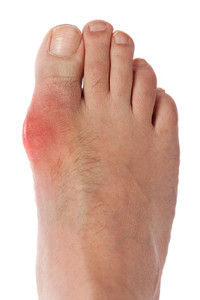 If the joint surrounding your big toe becomes inflamed and irritated, you may have a condition that is known as gout. Gout is considered to be a form of arthritis and typically causes severe pain and discomfort. Many patients experience gout attacks, which can occur suddenly and can last for extended periods of time. Some of the symptoms that are associated with gout may include heat emanating from the affected toe, redness, and swelling. Gout is generally caused by a condition that is known as hyperuricemia. This is the medical term given when there is excess uric acid in the blood levels. Uric acid comes from purines, which can be found in certain foods. If there is too much uric acid in the body, crystals may form in the joints of the big toe. This causes gout to develop. Gout can be managed when certain lifestyle changes are made, including making healthy eating choices and following a light exercise program. If you have gout, it may be considered to speak to a podiatrist.
If the joint surrounding your big toe becomes inflamed and irritated, you may have a condition that is known as gout. Gout is considered to be a form of arthritis and typically causes severe pain and discomfort. Many patients experience gout attacks, which can occur suddenly and can last for extended periods of time. Some of the symptoms that are associated with gout may include heat emanating from the affected toe, redness, and swelling. Gout is generally caused by a condition that is known as hyperuricemia. This is the medical term given when there is excess uric acid in the blood levels. Uric acid comes from purines, which can be found in certain foods. If there is too much uric acid in the body, crystals may form in the joints of the big toe. This causes gout to develop. Gout can be managed when certain lifestyle changes are made, including making healthy eating choices and following a light exercise program. If you have gout, it may be considered to speak to a podiatrist.
Gout is a foot condition that requires certain treatment and care. If you are seeking treatment, contact one of our podiatrists from Carolina Foot & Ankle. Our doctors will treat your foot and ankle needs.
What Is Gout?
Gout is a type of arthritis caused by a buildup of uric acid in the bloodstream. It often develops in the foot, especially the big toe area, although it can manifest in other parts of the body as well. Gout can make walking and standing very painful and is especially common in diabetics and the obese.
People typically get gout because of a poor diet. Genetic predisposition is also a factor. The children of parents who have had gout frequently have a chance of developing it themselves.
Gout can easily be identified by redness and inflammation of the big toe and the surrounding areas of the foot. Other symptoms include extreme fatigue, joint pain, and running high fevers. Sometimes corticosteroid drugs can be prescribed to treat gout, but the best way to combat this disease is to get more exercise and eat a better diet.
If you have any questions please feel free to contact one of our offices located in Huntersville Office | 16419 Northcross Dr Suite A, Huntersville, NC 28078; Mooresvillle Office | 206 Joe Knox Avenue Suite D, Mooresville, NC 28117; and Mountain Island | 10310 Couloak Drive, Charlotte, NC 28216. We offer the newest diagnostic and treatment technologies for all your foot and ankle needs.
Read more about Everything You Need to Know About Gout As pregnancy progresses, the body’s natural response is to produce additional fluids that accommodates the needs of the growing fetus. Most women experience swollen feet as a result of this, which can be uncomfortable. Research has indicated this accounts for approximately twenty-five percent of the weight that is gained during pregnancy. There are additional reasons why the feet become swollen. These include standing for extended periods of time, drinking large amounts of caffeine, or eating foods that are high in sodium content. There are methods that can be implemented to help reduce possible swelling. These consist of elevating your feet frequently throughout the day, wearing shoes that are comfortable, and spending limited time outside in the warmer weather. If you would like additional information about how pregnancy affects the feet, it is suggested to speak to a podiatrist who can answer any questions you may have.
As pregnancy progresses, the body’s natural response is to produce additional fluids that accommodates the needs of the growing fetus. Most women experience swollen feet as a result of this, which can be uncomfortable. Research has indicated this accounts for approximately twenty-five percent of the weight that is gained during pregnancy. There are additional reasons why the feet become swollen. These include standing for extended periods of time, drinking large amounts of caffeine, or eating foods that are high in sodium content. There are methods that can be implemented to help reduce possible swelling. These consist of elevating your feet frequently throughout the day, wearing shoes that are comfortable, and spending limited time outside in the warmer weather. If you would like additional information about how pregnancy affects the feet, it is suggested to speak to a podiatrist who can answer any questions you may have.
Pregnant women with swollen feet can be treated with a variety of different methods that are readily available. For more information about other cures for swollen feet during pregnancy, consult with one of our podiatrists from Carolina Foot & Ankle. Our doctors will attend to all of your foot and ankle needs.
What Foot Problems Can Arise During Pregnancy?
One problem that can occur is overpronation, which occurs when the arch of the foot flattens and tends to roll inward. This can cause pain and discomfort in your heels while you’re walking or even just standing up, trying to support your baby.
Another problem is edema, or swelling in the extremities. This often affects the feet during pregnancy but tends to occur in the later stages.
How Can I Keep My Feet Healthy During Pregnancy?
If you have any questions please feel free to contact one of our offices located in Huntersville Office | 16419 Northcross Dr Suite A, Huntersville, NC 28078; Mooresvillle Office | 206 Joe Knox Avenue Suite D, Mooresville, NC 28117; and Mountain Island | 10310 Couloak Drive, Charlotte, NC 28216. We offer the newest diagnostic and treatment technologies for all your foot and ankle needs.
Read more about Foot Care for Pregnant Women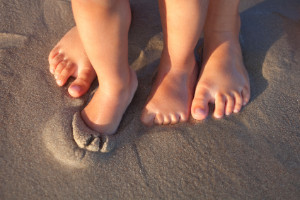 The human foot is comprised of several bones, ligaments, and muscles. It is important that our feet are flexible and stable so everyday activities can be completed with ease. Children may benefit at an early age from walking barefoot while indoors. This may help develop the grasping action in the toes, which can promote stability and muscle strength. Research has indicated the importance of measuring your child’s feet on a regular basis, and this is helpful in determining the correct shoe size. When choosing shoes for your child, it is important to ensure the foot is held firmly in place. This may be accomplished by choosing shoes that have laces or Velcro, which can hold the foot securely in the shoe. If you would like additional information on how to care for your child's feet, speak with your podiatrist.
The human foot is comprised of several bones, ligaments, and muscles. It is important that our feet are flexible and stable so everyday activities can be completed with ease. Children may benefit at an early age from walking barefoot while indoors. This may help develop the grasping action in the toes, which can promote stability and muscle strength. Research has indicated the importance of measuring your child’s feet on a regular basis, and this is helpful in determining the correct shoe size. When choosing shoes for your child, it is important to ensure the foot is held firmly in place. This may be accomplished by choosing shoes that have laces or Velcro, which can hold the foot securely in the shoe. If you would like additional information on how to care for your child's feet, speak with your podiatrist.
Making sure that your children maintain good foot health is very important as they grow. If you have any questions, contact one of our podiatrists of Carolina Foot & Ankle. Our doctors can provide the care you need to keep you pain-free and on your feet.
Keeping Children's Feet Healthy
Having healthy feet during childhood can help prevent medical problems later in life, namely in the back and legs. As children grow, their feet require different types of care. Here are some things to consider...
Although babies do not walk yet, it is still very important to take care of their feet.
Avoid putting tight shoes or socks on his or her feet.
Allow the baby to stretch and kick his or her feet to feel comfortable.
As a toddler, kids are now on the move and begin to develop differently. At this age, toddlers are getting a feel for walking, so don’t be alarmed if your toddler is unsteady or ‘walks funny’.
As your child gets older, it is important to teach them how to take care of their feet.
Show them proper hygiene to prevent infections such as fungus.
Be watchful for any pain or injury.
Have all injuries checked by a doctor as soon as possible.
Comfortable, protective shoes should always be worn, especially at play.
If you have any questions please feel free to contact one of our offices located in Huntersville Office | 16419 Northcross Dr Suite A, Huntersville, NC 28078; Mooresvillle Office | 206 Joe Knox Avenue Suite D, Mooresville, NC 28117; and Mountain Island | 10310 Couloak Drive, Charlotte, NC 28216. We offer the newest diagnostic and treatment technologies for all your foot and ankle needs.
Read more about What to Do to Keep Your Child’s Feet Healthy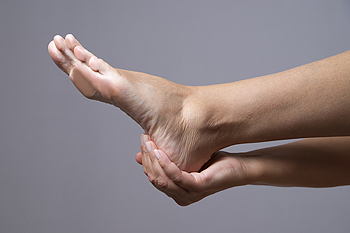 Tarsal tunnel syndrome is a condition that affects the posterior tibial nerve. This nerve runs along the inside of the ankle and foot, and when it becomes compressed and damaged it will become inflamed. This damage can be caused by continuous overuse of the foot and ankle. This might happen while participating in strenuous physical activities. Tarsal tunnel syndrome can also occur after a traumatic injury, and sometimes it develops suddenly without any obvious cause. Luckily, this is considered a rare condition. If it goes untreated, however, it can cause permanent nerve damage. If tarsal tunnel syndrome is caught early, then it is relatively easy to treat. If the condition becomes severe, then more aggressive treatments may need to be performed. Examples of treatment for severe cases include corrective devices, therapies, and sometimes surgery. If you believe you might have tarsal tunnel syndrome, then it is strongly recommended you consult with a podiatrist.
Tarsal tunnel syndrome is a condition that affects the posterior tibial nerve. This nerve runs along the inside of the ankle and foot, and when it becomes compressed and damaged it will become inflamed. This damage can be caused by continuous overuse of the foot and ankle. This might happen while participating in strenuous physical activities. Tarsal tunnel syndrome can also occur after a traumatic injury, and sometimes it develops suddenly without any obvious cause. Luckily, this is considered a rare condition. If it goes untreated, however, it can cause permanent nerve damage. If tarsal tunnel syndrome is caught early, then it is relatively easy to treat. If the condition becomes severe, then more aggressive treatments may need to be performed. Examples of treatment for severe cases include corrective devices, therapies, and sometimes surgery. If you believe you might have tarsal tunnel syndrome, then it is strongly recommended you consult with a podiatrist.
Tarsal tunnel syndrome can be very uncomfortable to live with. If you are experiencing tarsal tunnel syndrome, contact one of our podiatrists of Carolina Foot & Ankle. Our doctors can provide the care you need to keep you pain-free and on your feet.
Tarsal Tunnel Syndrome
Tarsal tunnel syndrome, which can also be called tibial nerve dysfunction, is an uncommon condition of misfiring peripheral nerves in the foot. The tibial nerve is the peripheral nerve in the leg responsible for sensation and movement of the foot and calf muscles. In tarsal tunnel syndrome, the tibial nerve is damaged, causing problems with movement and feeling in the foot of the affected leg.
Common Cause of Tarsal Tunnel Syndrome
The Effects of Tarsal Tunnel Syndrome
A physical exam of the leg can help identify the presence of tarsal tunnel syndrome. Medical tests, such as a nerve biopsy, are also used to diagnose the condition. Patients may receive physical therapy and prescriptive medication. In extreme cases, some may require surgery.
If you have any questions please feel free to contact one of our offices located in Huntersville Office | 16419 Northcross Dr Suite A, Huntersville, NC 28078; Mooresvillle Office | 206 Joe Knox Avenue Suite D, Mooresville, NC 28117; and Mountain Island | 10310 Couloak Drive, Charlotte, NC 28216. We offer the newest diagnostic and treatment technologies for all your foot and ankle needs.
Read more about Tarsal Tunnel Syndrome Rheumatoid arthritis is a condition that affects over 40 million Americans. Unfortunately, many people brush off their RA symptoms as less severe injuries. Many people with RA in their feet, notice the feeling of stiffness when they wake up in the morning. If you are suffering from rheumatoid arthritis, you may even start to notice joint stiffness throughout the day. Another common symptom is joint swelling due to inflammation. Those with arthritis will also notice pain in their joints that can potentially make walking difficult. Often, this pain appears when you are not putting the joints to use. If you suspect you have rheumatoid arthritis in your feet, you should make an appointment with your podiatrist to seek treatment immediately.
Rheumatoid arthritis is a condition that affects over 40 million Americans. Unfortunately, many people brush off their RA symptoms as less severe injuries. Many people with RA in their feet, notice the feeling of stiffness when they wake up in the morning. If you are suffering from rheumatoid arthritis, you may even start to notice joint stiffness throughout the day. Another common symptom is joint swelling due to inflammation. Those with arthritis will also notice pain in their joints that can potentially make walking difficult. Often, this pain appears when you are not putting the joints to use. If you suspect you have rheumatoid arthritis in your feet, you should make an appointment with your podiatrist to seek treatment immediately.
Because RA affects more than just your joints, including the joints in your feet and ankles, it is important to seek early diagnosis from your podiatrist if you feel like the pain in your feet might be caused by RA. For more information, contact one of our podiatrists of Carolina Foot & Ankle. Our doctors will assist you with all of your podiatric concerns.
What Is Rheumatoid Arthritis?
Rheumatoid Arthritis (RA) is an autoimmune disorder in which the body’s own immune system attacks the membranes surrounding the joints. Inflammation of the lining and eventually the destruction of the joint’s cartilage and bone occur, causing severe pain and immobility.
Rheumatoid Arthritis of the Feet
Although RA usually attacks multiple bones and joints throughout the entire body, almost 90 percent of cases result in pain in the foot or ankle area.
Symptoms
Diagnosis
Quick diagnosis of RA in the feet is important so that the podiatrist can treat the area effectively. Your doctor will ask you about your medical history, occupation, and lifestyle to determine the origin of the condition. Rheumatoid Factor tests help to determine if someone is affected by the disease.
If you have any questions please feel free to contact one of our offices located in Huntersville Office | 16419 Northcross Dr Suite A, Huntersville, NC 28078; Mooresvillle Office | 206 Joe Knox Avenue Suite D, Mooresville, NC 28117; and Mountain Island | 10310 Couloak Drive, Charlotte, NC 28216. We offer the newest diagnostic and treatment technologies for all your foot and ankle needs.
Read more about Rheumatoid Arthritis in the Feet Patients who have a type of neuropathy that is referred to as peripheral neuropathy may often notice a numbing or tingling sensation in their toes. As this condition worsens, there may be a burning pain that is felt, and this may be more noticeable at night. Additional symptoms may include weakened muscles or cramping, and balance and coordination may be affected. Research has shown there are three types of nerve groups, which may be distressed. Impulses that are sent from the brain and spinal cord to the muscles in the body are known as motor nerves. If damage to this group of nerves occurs, the result may be difficulty in walking. The function of the sensory nerves is to help people determine if an object is hot or cold, or rough or smooth. Tingling and numbness may happen if these nerves are affected by neuropathy. Additionally, the heart rate and blood pressure are controlled by autonomic nerves, and a patient who is afflicted with this type of neuropathy may experience dizziness or may have difficulty in swallowing. If you have any of these symptoms, please consult with a podiatrist who can guide you toward beginning the proper treatment.
Patients who have a type of neuropathy that is referred to as peripheral neuropathy may often notice a numbing or tingling sensation in their toes. As this condition worsens, there may be a burning pain that is felt, and this may be more noticeable at night. Additional symptoms may include weakened muscles or cramping, and balance and coordination may be affected. Research has shown there are three types of nerve groups, which may be distressed. Impulses that are sent from the brain and spinal cord to the muscles in the body are known as motor nerves. If damage to this group of nerves occurs, the result may be difficulty in walking. The function of the sensory nerves is to help people determine if an object is hot or cold, or rough or smooth. Tingling and numbness may happen if these nerves are affected by neuropathy. Additionally, the heart rate and blood pressure are controlled by autonomic nerves, and a patient who is afflicted with this type of neuropathy may experience dizziness or may have difficulty in swallowing. If you have any of these symptoms, please consult with a podiatrist who can guide you toward beginning the proper treatment.
Neuropathy
Neuropathy can be a potentially serious condition, especially if it is left undiagnosed. If you have any concerns that you may be experiencing nerve loss in your feet, consult with one of our podiatrists from Carolina Foot & Ankle. Our doctors will assess your condition and provide you with quality foot and ankle treatment for neuropathy.
What Is Neuropathy?
Neuropathy is a condition that leads to damage to the nerves in the body. Peripheral neuropathy, or neuropathy that affects your peripheral nervous system, usually occurs in the feet. Neuropathy can be triggered by a number of different causes. Such causes include diabetes, infections, cancers, disorders, and toxic substances.
Symptoms of Neuropathy Include:
Those with diabetes are at serious risk due to being unable to feel an ulcer on their feet. Diabetics usually also suffer from poor blood circulation. This can lead to the wound not healing, infections occurring, and the limb may have to be amputated.
Treatment
To treat neuropathy in the foot, podiatrists will first diagnose the cause of the neuropathy. Figuring out the underlying cause of the neuropathy will allow the podiatrist to prescribe the best treatment, whether it be caused by diabetes, toxic substance exposure, infection, etc. If the nerve has not died, then it’s possible that sensation may be able to return to the foot.
Pain medication may be issued for pain. Electrical nerve stimulation can be used to stimulate nerves. If the neuropathy is caused from pressure on the nerves, then surgery may be necessary.
If you have any questions, please feel free to contact one of our offices located in Huntersville Office | 16419 Northcross Dr Suite A, Huntersville, NC 28078; Mooresvillle Office | 206 Joe Knox Avenue Suite D, Mooresville, NC 28117; and Mountain Island | 10310 Couloak Drive, Charlotte, NC 28216. We offer the newest diagnostic and treatment technologies for all your foot care needs.
Read more about Neuropathy The medical condition that is known as hammertoe will typically affect the second, third, or fourth toe. If you notice a downward bend in the middle joints of those toes, it may often resemble the shape of a hammer. It typically causes pain and discomfort and wearing shoes may be difficult. The causes of hammertoe may include having a genetic trait, or wearing shoes that do not have adequate room in the toe area for the toes to move freely in. Additionally, if an injury has occurred to the toes, this may be a reason for this condition to develop. The toes may be unable to bend, and surgery may be required to permanently straighten the toes. If you are noticing symptoms of hammertoe, it is advised to schedule a consultation with a podiatrist who can guide your toward proper treatment.
The medical condition that is known as hammertoe will typically affect the second, third, or fourth toe. If you notice a downward bend in the middle joints of those toes, it may often resemble the shape of a hammer. It typically causes pain and discomfort and wearing shoes may be difficult. The causes of hammertoe may include having a genetic trait, or wearing shoes that do not have adequate room in the toe area for the toes to move freely in. Additionally, if an injury has occurred to the toes, this may be a reason for this condition to develop. The toes may be unable to bend, and surgery may be required to permanently straighten the toes. If you are noticing symptoms of hammertoe, it is advised to schedule a consultation with a podiatrist who can guide your toward proper treatment.
Hammertoes can be a painful condition to live with. For more information, contact one of our podiatrists of Carolina Foot & Ankle. Our doctors will answer any of your foot- and ankle-related questions.
Hammertoe
Hammertoe is a foot deformity that occurs due to an imbalance in the muscles, tendons, or ligaments that normally hold the toe straight. It can be caused by the type of shoes you wear, your foot structure, trauma, and certain disease processes.
Symptoms
Risk Factors
Treatment
If you have hammertoe, you should change into a more comfortable shoe that provides enough room for your toes. Exercises such as picking up marbles may strengthen and stretch your toe muscles. Nevertheless, it is important to seek assistance from a podiatrist in order to determine the severity of your hammertoe and see which treatment option will work best for you.
If you have any questions, please feel free to contact one of our offices located in Huntersville Office | 16419 Northcross Dr Suite A, Huntersville, NC 28078; Mooresvillle Office | 206 Joe Knox Avenue Suite D, Mooresville, NC 28117; and Mountain Island | 10310 Couloak Drive, Charlotte, NC 28216. We offer the newest diagnostic and treatment technologies for all your foot care needs.
Read more about What Are Hammertoes?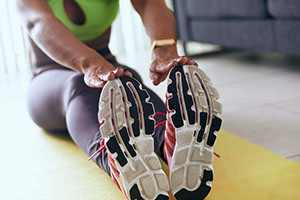 Many runners look forward to starting their running practice and may overlook the importance of properly stretching beforehand. Running injuries may be prevented if the time is taken to implement correct stretching techniques, and this may typically take a limited amount of time. It may be beneficial to ease into running, which can be preceded by gently walking for a few minutes. Running injuries that include ankle sprains and stress fractures can be caused by overuse, and may be avoided by resting the body after running for an extended period of time. Many runners know the importance of taking time off between runs, and may strengthen the body through gym workouts. If you would like additional information about how running injuries may affect the feet, it is suggested to speak to a podiatrist who can answer any questions you may have.
Many runners look forward to starting their running practice and may overlook the importance of properly stretching beforehand. Running injuries may be prevented if the time is taken to implement correct stretching techniques, and this may typically take a limited amount of time. It may be beneficial to ease into running, which can be preceded by gently walking for a few minutes. Running injuries that include ankle sprains and stress fractures can be caused by overuse, and may be avoided by resting the body after running for an extended period of time. Many runners know the importance of taking time off between runs, and may strengthen the body through gym workouts. If you would like additional information about how running injuries may affect the feet, it is suggested to speak to a podiatrist who can answer any questions you may have.
All runners should take extra precaution when trying to avoid injury. If you have any concerns about your feet, contact one of our podiatrists of Carolina Foot & Ankle. Our doctors will treat your foot and ankle needs.
How to Prevent Running Injuries
There are a lot of mistakes a runner can make prior to a workout that can induce injury. A lot of athletes tend to overstretch before running, instead of saving those workouts for a post-run routine. Deep lunges and hand-to-toe hamstring pulls should be performed after a workout instead of during a warmup. Another common mistake is jumping into an intense routine before your body is physically prepared for it. You should try to ease your way into long-distance running instead of forcing yourself to rush into it.
More Tips for Preventing Injury
If you have any questions, please feel free to contact one of our offices located in Huntersville Office | 16419 Northcross Dr Suite A, Huntersville, NC 28078; Mooresvillle Office | 206 Joe Knox Avenue Suite D, Mooresville, NC 28117; and Mountain Island | 10310 Couloak Drive, Charlotte, NC 28216. We offer the newest diagnostic and treatment technologies for all your foot care needs.
Read more about Preventing Running Injuries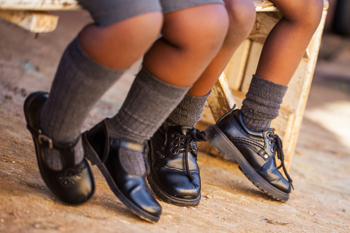 The condition that is referred to as Sever’s disease will typically affect young teenagers. Noticeable symptoms may include inflammation and swelling in the heel, and this may be a result of an injury that may have occurred to the growth plate. Patients who are afflicted with this condition may notice they are walking on tip toes or limping, and their feet may feel stiff when they are waking up. It typically affects older children who frequently participate in sporting activities. This may cause the tendons and muscles to tighten, and pressure may be put on the growth plate. Mild relief may be found if the activities are stopped that may have caused this condition. Additionally, some patients find it helpful to wear shoes that have an open back, or to wrap the heel with an elastic bandage. If you think your child may have Sever’s disease, it is advised to consult with a podiatrist who can properly treat this condition.
The condition that is referred to as Sever’s disease will typically affect young teenagers. Noticeable symptoms may include inflammation and swelling in the heel, and this may be a result of an injury that may have occurred to the growth plate. Patients who are afflicted with this condition may notice they are walking on tip toes or limping, and their feet may feel stiff when they are waking up. It typically affects older children who frequently participate in sporting activities. This may cause the tendons and muscles to tighten, and pressure may be put on the growth plate. Mild relief may be found if the activities are stopped that may have caused this condition. Additionally, some patients find it helpful to wear shoes that have an open back, or to wrap the heel with an elastic bandage. If you think your child may have Sever’s disease, it is advised to consult with a podiatrist who can properly treat this condition.
Sever's disease often occurs in children and teens. If your child is experiencing foot or ankle pain, see one of our podiatrists from Carolina Foot & Ankle. Our doctors can treat your child’s foot and ankle needs.
Sever’s Disease
Sever’s disease is also known as calcaneal apophysitis, which is a medical condition that causes heel pain I none or both feet. The disease is known to affect children between the ages of 8 and 14.
Sever’s disease occurs when part of the child’s heel known as the growth plate (calcaneal epiphysis) is attached to the Achilles tendon. This area can suffer injury when the muscles and tendons of the growing foot do not keep pace with bone growth. Therefore, the constant pain which one experiences at the back of the heel will make the child unable to put any weight on the heel. The child is then forced to walk on their toes.
Symptoms
Acute pain – Pain associated with Sever’s disease is usually felt in the heel when the child engages in physical activity such as walking, jumping and or running.
Highly active – Children who are very active are among the most susceptible in experiencing Sever’s disease, because of the stress and tension placed on their feet.
If you have any questions, please feel free to contact one of our offices located in Huntersville Office | 16419 Northcross Dr Suite A, Huntersville, NC 28078; Mooresvillle Office | 206 Joe Knox Avenue Suite D, Mooresville, NC 28117; and Mountain Island | 10310 Couloak Drive, Charlotte, NC 28216. We offer the newest diagnostic and treatment technologies for all your foot and ankle injuries.
Read more about Sever's Disease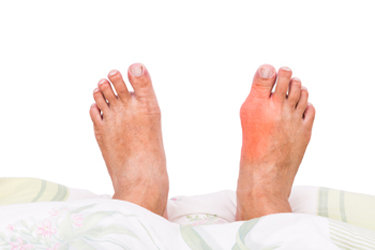 The medical term referred to as gout will typically affect the big toe and surrounding areas. Typical symptoms may generally include severe pain and discomfort in the area of the big toe, heat that may radiate from the foot, in addition to swelling and redness. It occurs as a result of elevated uric acid levels in the blood, which causes crystals to form in the joints. There may be several reasons for this to happen, including diabetes, high blood pressure, or congestive heart failure. Additionally, eating foods that have elevated fructose levels may lead to the onset of gout, in addition to drinking excess alcohol, or eating red meat or seafood. Successful prevention and treatment of gout may begin with eating healthy foods and implementing a gentle exercise program. If obesity exists, it may be helpful to lose excess weight which may aid in protecting the joints. If you are having gout attacks, it is advised to speak to a podiatrist who can properly treat this condition.
The medical term referred to as gout will typically affect the big toe and surrounding areas. Typical symptoms may generally include severe pain and discomfort in the area of the big toe, heat that may radiate from the foot, in addition to swelling and redness. It occurs as a result of elevated uric acid levels in the blood, which causes crystals to form in the joints. There may be several reasons for this to happen, including diabetes, high blood pressure, or congestive heart failure. Additionally, eating foods that have elevated fructose levels may lead to the onset of gout, in addition to drinking excess alcohol, or eating red meat or seafood. Successful prevention and treatment of gout may begin with eating healthy foods and implementing a gentle exercise program. If obesity exists, it may be helpful to lose excess weight which may aid in protecting the joints. If you are having gout attacks, it is advised to speak to a podiatrist who can properly treat this condition.
Gout is a painful condition that can be treated. If you are seeking treatment, contact one of our podiatrists from Carolina Foot & Ankle. Our doctors will treat your foot and ankle needs.
What Is Gout?
Gout is a form of arthritis that is characterized by sudden, severe attacks of pain, redness, and tenderness in the joints. The condition usually affects the joint at the base of the big toe. A gout attack can occur at any random time, such as the middle of the night while you are asleep.
Symptoms
Risk Factors
Prior to visiting your podiatrist to receive treatment for gout, there are a few things you should do beforehand. If you have gout you should write down your symptoms--including when they started and how often you experience them, important medical information you may have, and any questions you may have. Writing down these three things will help your podiatrist in assessing your specific situation so that he or she may provide the best route of treatment for you.
If you have any questions, please feel free to contact one of our offices located in Huntersville Office | 16419 Northcross Dr Suite A, Huntersville, NC 28078; Mooresvillle Office | 206 Joe Knox Avenue Suite D, Mooresville, NC 28117; and Mountain Island | 10310 Couloak Drive, Charlotte, NC 28216. We offer the newest diagnostic and treatment technologies for all your foot care needs.
Read more about Gout